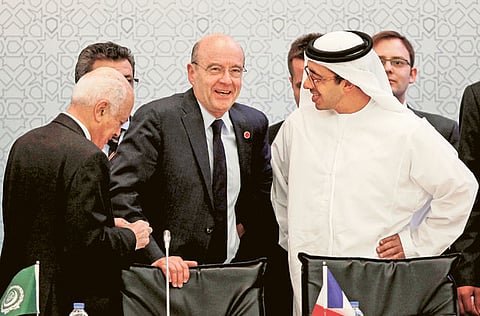Gulf states to set up fund for Syrian rebels, defectors
Plan which aims to undermine Al Assad's army reflects frustration

Istanbul: Saudi Arabia and other Gulf countries are creating a multi-million dollar fund to pay salaries to members of the rebel Free Syrian Army and soldiers who defect from the regime and join opposition ranks, participants at a meeting on Syria said yesterday.
One delegate described the fund as a "pot of gold" to undermine President Bashar Al Assad's army.
The large-scale plan to help Syria's badly overmatched rebels offers a solution to the international divide over whether to arm the rebels or support them through only non-lethal or humanitarian means.
It also reflects frustration with months of failed diplomacy aimed at pressuring Al Assad to stop his crackdown on dissent, as well as hopes of forcing him out by shifting the military balance on the ground.
Millions per month
Conference participants confirmed the plan on condition of anonymity because details were still being worked out. It was unclear how the fund would be set up and monitored, or how salaries would be guaranteed. A participant said the fund would involve millions of dollars every month.
The Saudis and other Gulf states have proposed giving weapons to the rebels, while the US and other allies, including Turkey, have balked out of fear of fuelling an all-out civil war. Washington hasn't taken any public position on the fund, but it appears that it has given tacit support to its Arab allies.
The salaries would aim to entice reluctant servicemen in Al Assad's military to break ranks and join the insurgency. With Syria's economy in a spiral, the Syrian opposition and US and Arab officials hope soldiers will desert in large numbers and accelerate the downfall of the Al Assad regime.
A peace plan by UN-Arab League envoy Kofi Annan has so far failed to take hold amid fresh reports of deadly violence.
"The Syrian regime should not be allowed at any cost to manipulate this plan to gain time," Turkish Prime Minister Recep Tayyip Erdogan said in an opening address.
Erdogan also indicated military options might have to be considered, if Syria does not cooperate with Annan's plan and the UN Security Council fails to unite in opposition to Al Assad. He referred to the vetoes of UN censure of Al Assad by Russia and China, which fear the measures could lead to foreign military intervention.
‘No other choice'
"If the UN Security Council fails once again to bring about its historic responsibility, there will be no other choice than to support the Syrian people's right to self-defence," Erdogan said.
US Secretary of State Hillary Clinton also expressed scepticism that the Syrian government would observe Annan's plans, which call for an immediate cease-fire and a Syrian-led negotiation process.
"Nearly a week has gone by, and we have to conclude that the regime is adding to its long list of broken promises," Clinton said. "The world must judge [Al] Assad by what he does, not by what he says. And we cannot sit back and wait any longer."
Clinton urged unity behind a plan that includes more sanctions, humanitarian aid, support for the opposition and the promise of justice one day for regime figures involved in atrocities. She said the US is providing communications equipment to help opposition members in Syria organise, remain in contact with the outside world and evade regime attacks.
Burhan Galioun, leader of the opposition Syrian National Council, called for the strengthening of Syrian rebel forces as well as "security corridors" inside Syria, a reference to internationally protected zones on Syrian territory that would allow the delivery of aid to civilians. However, the nations meeting in Istanbul have so far failed to agree on such an intervention, which could involve the risky deployment of foreign security forces.



